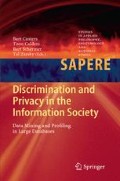Abstract
Due to recent technological developments it became possible to generate and store increasingly larger datasets. Not the amount of data, however, but the ability to interpret and analyze the data, and to base future policies and decisions on the outcome of the analysis determines the value of data. The amounts of data collected nowadays not only offer unprecedented opportunities to improve decision procedures for companies and governments, but also hold great challenges. Many pre-existing data analysis tools did not scale up to the current data sizes. From this need, the research filed of data mining emerged. In this chapter we position data mining with respect to other data analysis techniques and introduce the most important classes of techniques developed in the area: pattern mining, classification, and clustering and outlier detection. Also related, supporting techniques such as pre-processing and database coupling are discussed.
Access this chapter
Tax calculation will be finalised at checkout
Purchases are for personal use only
Preview
Unable to display preview. Download preview PDF.
References
Adriaans, P., Zantinge, D.: Data mining. Addison Wesley Longman, Harlow (1996)
Bailey, K.D.: Typologies and Taxonomies; an introduction to classification techniques. In: Quantitative Applications in the Social Sciences, vol. (102). SAGE Publications, Thousand Oaks (1994)
Berry, M.J.A., Linoff, G.S.: Mastering Data Mining; the Art and Science of Customer Relationship Management. Wiley Computer Publishing, John Wiley & Sons, Inc., New York (2000)
Fayyad, U.M., Uthurusamy, R.: Proceedings of the First International Conference on Knowledge Discovery and Data Mining (KDD 1995), Montreal, Canada, August 20-21. AAAI Press (1995)
Fayyad, U.M., Piatetsky-Shapiro, G., Smyth, P.: The KDD Process for Extracting Useful Knowledge from Volumes of Data. Communications of the ACM 39(11) (1996a)
Fayyad, U.M., Piatetsky-Shapiro, G., Smyth, P.: From Data Mining to Knowledge Discovery: An Overview. In: Fayyad, U.M., Piatetsky-Shapiro, G., Smyth, P., Uthurusamy, R. (eds.) Advances in Knowledge Discovery and Data Mining. AAAI Press/The MIT Press, Menlo Park, California (1996b)
Gray, J., Chaudhuri, S., Bosworth, A., Layman, A., Reichart, D., Venkatrao, M., Pellow, F., Pirahesh, H.: Data Cube: A Relational Aggregation Operator Generalizing Group-By, Cross-Tab, and Sub-Totals. Journal Data Mining and Knowledge Discovery 1(1) (1997)
Han, J., Kamber, M.: Data Mining: Concepts and Techniques. In: Gray, J. (Series ed.) The Morgan Kaufmann Series in Data Management Systems, 2nd edn. Morgan Kaufmann Publishers (March 2006)
Hand, D., Mannila, H., Smyth, P.: Principles of Data Mining. MIT press (2001)
Holsheimer, M., Siebes, A.: Data Mining: the Search for Knowledge in Databases. Report CS-R9406 Centrum voor Wiskunde en Informatica, Computer Science/Department of Algorithmics and Architecture (1991)
National Research Council. For the Record; protecting electronic health information, Computer Science and Telecommunications Board, National Research Council. National Academic Press, Washington, DC (1997)
OTA Report. Computer Profiling. In: Electronic Record Systems and Individual Privacy. OTA Report, Congress of the United States (1986)
SPSS Inc. Data Mining with Confidence. SPSS Inc., Chicago (1999)
Author information
Authors and Affiliations
Corresponding author
Editor information
Editors and Affiliations
Rights and permissions
Copyright information
© 2013 Springer-Verlag Berlin Heidelberg
About this chapter
Cite this chapter
Calders, T., Custers, B. (2013). What Is Data Mining and How Does It Work?. In: Custers, B., Calders, T., Schermer, B., Zarsky, T. (eds) Discrimination and Privacy in the Information Society. Studies in Applied Philosophy, Epistemology and Rational Ethics, vol 3. Springer, Berlin, Heidelberg. https://doi.org/10.1007/978-3-642-30487-3_2
Download citation
DOI: https://doi.org/10.1007/978-3-642-30487-3_2
Publisher Name: Springer, Berlin, Heidelberg
Print ISBN: 978-3-642-30486-6
Online ISBN: 978-3-642-30487-3
eBook Packages: EngineeringEngineering (R0)

